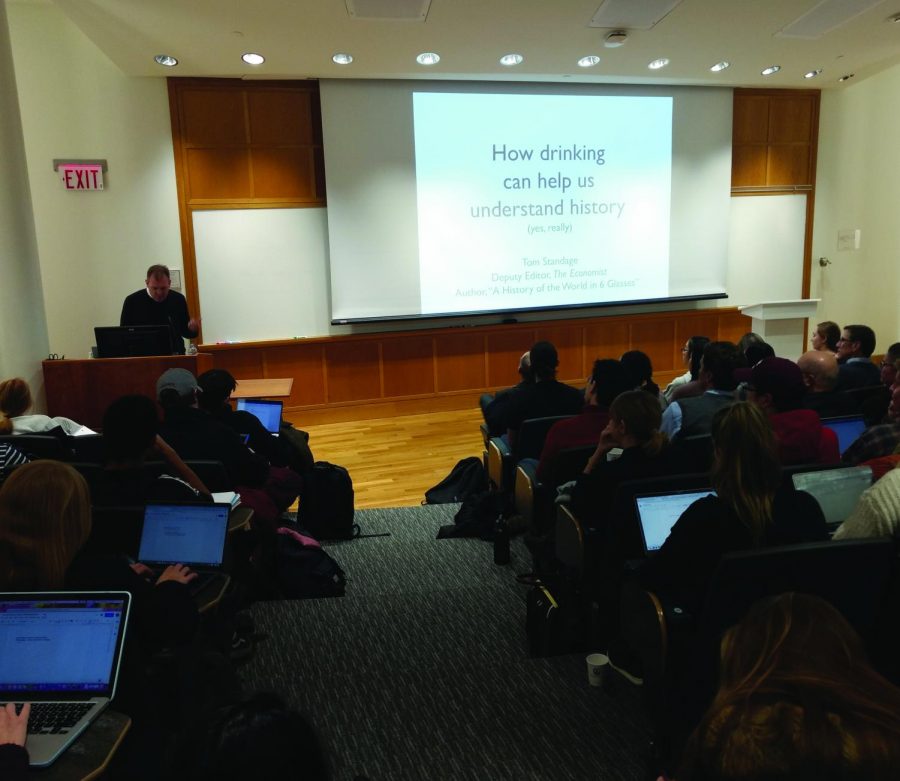Renowned Journalist Tom Standage Lectures on History and Drinking
Deputy Editor of The Economist Tom Standage paid a visit to campus to expose students to the history, context and influence of specific drinks in modern culture. Standage’s lecture “How Drinking Can Help Us Understand History,” drew from the content of his New York Times bestseller, The World in Six Glasses. The lecture, sponsored by the Center for Freedom and Western Civilization and the Forum on Economic Freedom, focused on the important ways in which beer, wine, spirits, tea, coffee and Coca-Cola have shaped world history. The event took place in Persson Auditorium on Wednesday, November 13.
Standage structured his lecture around these six drinks and the findings on each of them from his book. Standage addressed ways in which each of these beverages hold social, historic and economic significance.
“Drinks have a closer connection to the flow of history than you might think,” Standage said.
Standage linked each beverage to a historic time period. The journalist showed how beer’s roots in ancient Mesopotamian culture during the neolithic era and cheap manufacturing process set it on the path to become what he calls the “honest drink of the working man.” Standage then showed how wine and its more expensive and time consuming production made it the drink of the wealthy, mirroring social hierarchies throughout historic and contemporary cultures.
Standage discussed liquor, tea, coffee and Coca-Cola in the second half of his lecture, to reflect the more recent social and economic impacts of the four beverages. He highlighted the impact that both tea and liquor had in the colonial era, two connections not he says are not commonly recognized. Standage said that while many students today learn about the role of tea in the Revolutionary War, fewer learn of the role of liquor.
“Rum was the real spirit of 1776,” Standage said. Standage also discussed the historic role of coffee in Europe during the enlightenment era. Standage credited the arrival of coffee into the European mainstream with “sobering up” the continent and making way for a series of scientific and cultural revolutions which shaped modern western culture.
“It’s a grave and wholesome liquor that makes the brain quicker,” Standage said. “Today, coffee is a drink used for intellectual conversations and business meetings.”
Professor of Economics Chad Sparber assigned Standage’s book to his First-Year Seminar course this semester, hoping to enlighten students on drink production and consumption.
“I would love for our students to mature past the boorish aspects of drinking culture… People put a lot of care and effort into producing our drinks; we should take time to appreciate their work,” Sparber said.
Sophomore Kristen Miquel said she was interested by Standage’s historical perspective on beverages and left the lecture with a new-found appreciation for these drinks in modern culture.
“I had never thought of drinks as a way to track humanity’s history, so I was pleasantly surprised and interested by the lecture today,” Miquel said. “After learning about the various ties between drinks and certain categories, such as Wine and Philosophy, I felt as if I gained a greater understanding and appreciation for alcohol and other drinks in the context of history.”
Junior Justin Pang said he gained a new perspective on the impact and importance of these six drinks from listening in to Standage’s lecture.
“It was very interesting to learn about how the six drinks discussed have had such a historical significance on how societies developed and were shaped over time,” Pang said. [This is] something I haven’t considered before.”
Greta Ferdinand is a senior from Portsmouth, NH concentrating in mathematics with a minor in philosophy. She has previously served as news editor and contributes...











